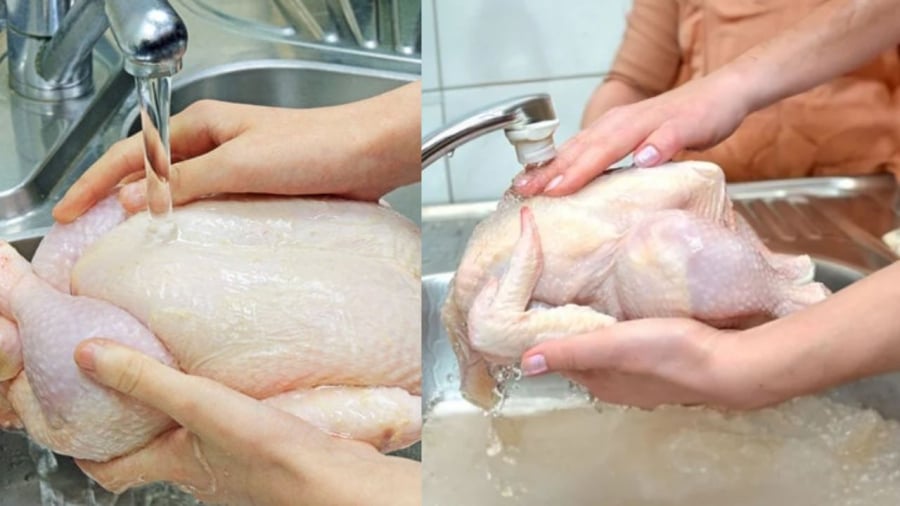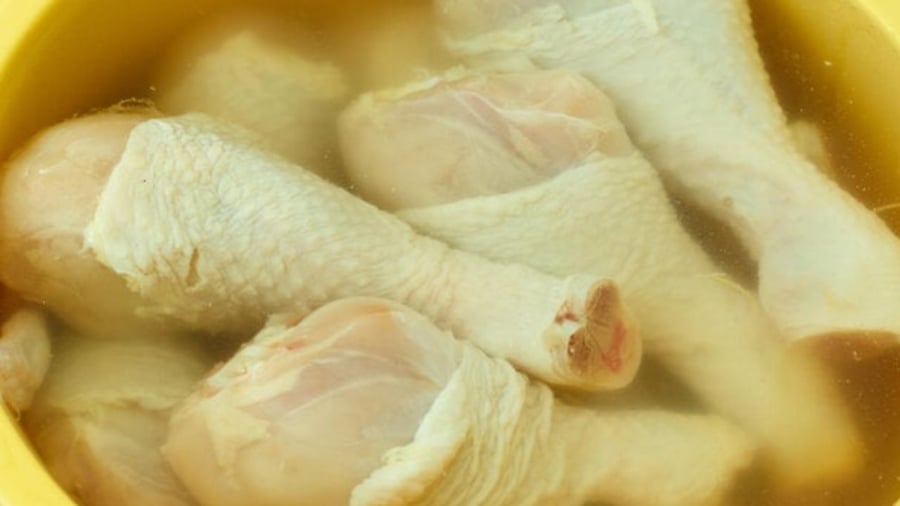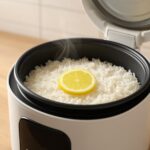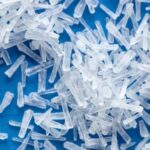Washing chicken is a common practice among many Vietnamese homemakers, aiming to remove dirt and odor before cooking. Especially, chicken bought from wet markets is often not cleaned properly.
However, according to the recommendations of medical and food safety experts, washing chicken under running water not only fails to eliminate bacteria but can also pose serious health risks. Let’s explore the reasons why we should avoid washing chicken under the tap and learn the correct way to ensure food hygiene.
1. Why shouldn’t we wash chicken under running water?
While it is advisable to wash vegetables and fruits under running water, the same practice is ill-advised for chicken due to the following reasons:
1.1. Bacteria can easily spread to surrounding surfaces: Raw chicken is among the types of food with a high risk of bacterial contamination, especially Campylobacter and Salmonella, which are the primary causes of food poisoning. When you wash chicken under running water, the force of the water can cause bacteria from the chicken’s surface to splatter onto surrounding areas like the sink, countertops, cutting boards, utensils, and even clothing, increasing the risk of cross-contamination.
According to the US Centers for Disease Control and Prevention (CDC), washing chicken with water does not kill bacteria but may spread them to other areas of the kitchen, compromising food safety within the household.

1.2. It doesn’t effectively remove bacteria as expected: Many people believe that washing chicken will help eliminate bacteria. However, in reality, bacteria that are deeply embedded in the meat will not be removed by cold water. Washing only removes surface dirt but fails to kill disease-causing bacteria, which can only be achieved by cooking at high temperatures.
1.3. It increases the risk of food poisoning: The spread of bacteria to kitchen surfaces and utensils doesn’t only affect the cook but can also contaminate other foods like raw vegetables and fruits if they are stored nearby. This heightens the risk of food poisoning for the entire family, especially children, the elderly, and individuals with weakened immune systems.
2. How can we properly clean chicken?
2.1. Avoid washing under the tap and opt for alternative methods:
Instead of washing chicken under running water, you can try the following approaches:
- Wash in a separate container: Rather than washing the chicken directly under the tap, use a separate container filled with water. After washing the chicken, carefully dispose of the water down the drain and clean the container thoroughly.
- Pat dry with disposable paper towels: Use paper towels to absorb any excess fluid, blood, or dirt from the chicken’s surface. Afterward, discard the used paper towels in the trash and wash your hands thoroughly with soap.
- Neutralize odors with natural ingredients: If you want to eliminate any unpleasant odors, you can use a diluted solution of vinegar or salt water. Soak the chicken in this solution for a few minutes, then let it air dry. Avoid soaking for too long, as it may affect the freshness of the meat. Remember to dispose of the used solution carefully, avoiding any splattering.
2.2. Ensure thorough cooking to kill bacteria:
According to the CDC, the internal temperature of chicken should reach a minimum of 74°C (165°F) to ensure the complete elimination of harmful bacteria. It is advisable to use a food thermometer to check the temperature, especially when grilling or roasting a whole chicken. If a thermometer is unavailable, ensure that the meat is no longer pink, the juices run clear, and there is no visible blood.

2.3. Practice good hygiene after handling raw chicken:
Wash your hands thoroughly with soap for at least 20 seconds after handling raw chicken.
Sanitize all surfaces and utensils (knives, cutting boards, bowls) with hot water and detergent after use.
Use separate cutting boards for raw meat and produce to prevent cross-contamination.
3. Important notes when handling and preparing chicken
Avoid placing raw chicken near ready-to-eat foods like fruits, raw vegetables, or bread.
Store raw chicken properly in the refrigerator: Keep raw chicken in the coldest part of the fridge, typically at 0–4°C, and consume it within 1–2 days. If you’re not using it immediately, freeze it to prevent bacterial growth.
When thawing frozen chicken, it’s best to do so overnight in the refrigerator rather than at room temperature.
Washing chicken under running water may seem harmless, but it can have detrimental effects on food safety due to the potential spread of bacteria. To safeguard the health of your family, refrain from washing chicken under the tap, and instead, adopt the proper cleaning and handling practices outlined above. Raising awareness about food handling not only protects your well-being but also contributes to improving overall food safety standards within the community.
“A Squeeze of Lemon: The Simple Hack to Keep Rice Fresh in Hot and Humid Climates”
In hot and humid climates, cooked rice can quickly spoil if left at room temperature. A simple trick to prevent this is to add a slice of lemon while cooking the rice. This folk method not only has scientific backing but also enhances the aroma and flavor of the rice, while extending its shelf life.
The Showerhead is Dirtier Than a Toilet: Expert’s Guide to 5 Easy Cleaning Methods
For an efficient and thorough clean, it is recommended to disassemble the showerhead and clean each component individually. Ensure that all parts are completely dry before reassembling. This meticulous approach ensures that any built-up dirt or grime is effectively removed, maintaining optimal performance and water flow.






































